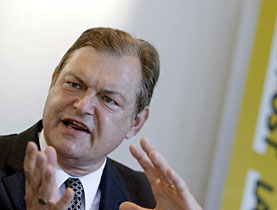Swiss Post chairman bows out under pressure

After just nine months in office, the chairman of Swiss Post, Claude Béglé, has bowed to pressure from all sides to resign.
The writing was on the wall for Béglé as his appointment and management style became a political football in recent weeks, following the resignation of the chief executive and two members of the board who fell out with him.
Communications Minister Moritz Leuenberger, who has stood behind Béglé since the power struggle at Swiss Post went public in December, had appointed a working group to assess the situation.
Its conclusions made Béglé’s position untenable. No one within the company wanted to contemplate a future with the deeply unpopular chairman at the helm.
The 61-year-old said that long-running and rancorous debates over strategy, personal attacks and public defamation contributed to his decision to quit.
The cabinet decided at its weekly Wednesday meeting to appoint Peter Hasler as Béglé’s successor. The former head of the Swiss Employers’ Association is to take over the position with immediate effect.
“Mistakes in communicating”
“It was always my intention to serve Swiss Post to the best of my abilities,“ Béglé told a news conference on Wednesday.
He said that since his nomination, and even before he took up office, there had been a united front against him.
“The old guard fought against new ideas and fresh blood. There was also deep-rooted opposition to a culture change,” he said.
Béglé would not be drawn on allegations that, as a French speaker, he was a victim of the German-speaking majority.
However, he accused former board members of orchestrating a campaign against him.
He acknowledged a number of “mistakes in communicating” and what he described as misunderstandings over the strategy of the Swiss Post, particularly abroad. He also reported that he is a director on several other company boards.
Béglé said he had occasionally also acted too hastily.
The findings of a working group set up by the communications ministry had led him to draw his own conclusions given the continuing opposition within the Post leadership, he said.
“I decided to step down in the interest of the Post. The organisation needs calm now.”
Media “lynching”
The Béglé saga has received exhaustive coverage in the Swiss media and his resignation, with immediate effect, is front page news in all regions. The coverage exposes political and linguistic divides.
The Tribune de Genève newspaper depicts Béglé’s fall as a media lynching, which “leaves a bitter taste”, blaming a concerted campaign by German-speaking Sunday newspapers to oust the French-speaking chairman.
The paper asks the question who benefits from the “crime” and points the finger at the old guard of the Swiss Post, “who could not bear the thundering arrival of the man from canton Vaud more used to working in international firms subject to competition”.
The Tages-Anzeiger newspaper comes to the conclusion that Béglé was the wrong man in the wrong place.
“He did not manage to give the impression internally or externally that he had the right answers. With his brusque manner he was never suited to the culture of the Post.”
The paper also finds fault with Leuenberger’s handling of the situation.
Problems
Behind the public battle at the top of Swiss Post, the problems of the former state monopoly remain the same.
How can universal postal service be maintained when people send fewer letters and use over-the-counter services at their local post office less and less frequently?
Béglé’s answer was aggressive expansion abroad but the directors were unwilling to follow this risky strategy.
June 2008: Claude Béglé named incoming chairman of Swiss Post
April 2009: Béglé takes office
December 2009: Chief executive Michel Kunz resigns, followed by board member Rolf Hug
January 6 2010: Another board member, Wolfgang Werlé, resigns. All three blame differences with Béglé
January 19: Claude Béglé resigns with immediate effect
January 20: Cabinet names Peter Hasler as successor to Béglé
According to its 2008 annual report Swiss Post was active in 20 countries and 8,000 employees are involved in its international activities.
Foreign revenue from letter and package deliveries accounts for a fifth of turnover, that is SFr1.8 billion.
From January to September, Swiss Post reduced 1,200 full-time positions, affecting around 1,700 people. Further job cuts are expected.
Employing around 33,000 people, the Post is the country’s second-largest employer. It generated a profit of SFr825 million ($790 million) on revenues of nearly SFr9 billion in 2008.

In compliance with the JTI standards
More: SWI swissinfo.ch certified by the Journalism Trust Initiative






You can find an overview of ongoing debates with our journalists here. Please join us!
If you want to start a conversation about a topic raised in this article or want to report factual errors, email us at english@swissinfo.ch.